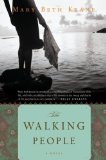Summary | Excerpt | Reading Guide | Reviews | Beyond the Book | Read-Alikes | Genres & Themes | Author Bio

Critics' Opinion:
Readers' Opinion:
First Published:
May 2009, 416 pages
Paperback:
May 2010, 416 pages
 Book Reviewed by:
Book Reviewed by:
BookBrowse First Impression Reviewers
Buy This Book
This article relates to The Walking People
Among themselves, Travellers refer to themselves as Pavees. To
outsiders they are often referred to as pikeys, knackers or tinkers (the latter
two descriptions refer to traditional crafts in which they were employed,
rendering animals and tin-smithing; the first two are considered particularly
derogatory). In Irish, they are known as Lucht Siúil - the walking people - hence the title of Mary Beth Keane's novel. Sometimes they are also referred to as diddycoys - which is a Roma term for a child of mixed Roma and non-Roma parentage; when used in the context of Travellers it refers to the fact that they are not "Gypsy" by blood but have adopted a similar lifestyle.
A 2006 Irish national census recorded 22,400 Travellers in the country,
about 0.5% of the population (but many believe the numbers are larger), with
95% living in urban areas (these days, many choose to settle in one location but may travel for seasonal work). It is estimated that there are a further 15-30,000 Travellers in Great Britain and about 7,000 in the USA, particularly based in
Murphy Village, South Carolina; and the Fort Worth suburb of White Settlement, TX.
The historical origins of the Travellers are disputed. Travellers themselves
claim ancient origins, even though it is clear that some adopted Traveller
customs recently. A long held believe is that Travelers are descended from landowners made homeless by Oliver Cromwell's military campaign in Ireland and the 1840s famine, but now it is thought their origins maybe older and more complex - but with no written historical record it is difficult to know.
Travellers are distinctly different from the Roma (sometimes known as Gypsies); for more about the Roma People see the sidebar to Jacqueline Winspear's An Incomplete Revenge). Whereas the Roma are considered a unique ethnic group (studies of traditional Roma show that they are genetically different from the general population), in Ireland the Travellers are considered a social group, that is to say they are genetically one with the general population but choose to live differently. Recent research has identified that certain genetic diseases are more common in the Irish Traveller population but it is not clear whether this is a result of a distinct ancestry or simply the effect of intermarriage.
Travellers have their own customs and language, which is known to the linguistic community as Shelta but often referred to as Cant by the general population (it is believed to have developed, in part, as a means of excluding outsiders from understanding their conversations). They tend to be keen dog breeders, particularly of greyhounds and lurchers; and, despite having given up their horse-drawn carts, have a long-standing interest in horses - the annual horse fair at
Ballinasloe continues to be a big draw for the community.
Although their birthrate is possibly the highest in Europe and double the Irish
national average, apparently a third of Travellers die before they are 25, and four out of five are dead by 65. They are 10 times more likely to die in road
accidents and their infants are ten times as likely to die before the age of two.
Interesting Links:
Filed under Society and Politics
![]() This "beyond the book article" relates to The Walking People. It originally ran in May 2009 and has been updated for the
May 2010 paperback edition.
Go to magazine.
This "beyond the book article" relates to The Walking People. It originally ran in May 2009 and has been updated for the
May 2010 paperback edition.
Go to magazine.





The House on Biscayne Bay
by Chanel Cleeton
As death stalks a gothic mansion in Miami, the lives of two women intertwine as the past and present collide.

The Flower Sisters
by Michelle Collins Anderson
From the new Fannie Flagg of the Ozarks, a richly-woven story of family, forgiveness, and reinvention.

The Funeral Cryer by Wenyan Lu
Debut novelist Wenyan Lu brings us this witty yet profound story about one woman's midlife reawakening in contemporary rural China.
Your guide toexceptional books
BookBrowse seeks out and recommends the best in contemporary fiction and nonfiction—books that not only engage and entertain but also deepen our understanding of ourselves and the world around us.